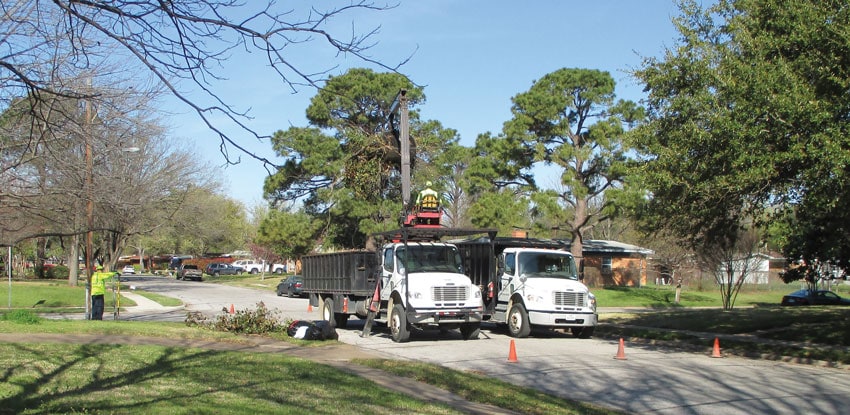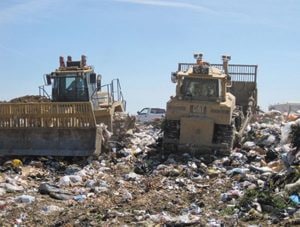Actively engaged in the solid waste industry to address operational concerns early, the city of Irving works collaboratively with the counties and cities in their area to create the best approaches to current challenges.
The City of Irving, TX is located in the heart of the Dallas/Fort Worth Metroplex. Serving more than 250,000 residents, the city’s Solid Waste Service Department (SWS) is the exclusive service provider for residential service, picking up refuse twice per week and single-stream recycling once per week, as well as brush/bulky waste collection once per week and curbside special waste collection on demand. The SWS also owns and operates the Type 1 Hunter Ferrell Landfill, accepting residential waste from the city and commercial waste from a designated waste hauler. The Hunter Ferrell Landfill has been in operation since April 1981.
SWS has 96 employees, a truck fleet of 36 front line collection vehicles and 12 front line pieces of equipment to operate the landfill. The Department collects paper, cardboard, paperboard, plastic (1 to 7), glass, steel and tin cans, aluminum cans and aseptic containers in their curbside collection program. At the landfill, metals, tires, lead acid batteries and paint for recycling is also collected. Additionally, all of the brush collected curbside is ground into mulch and sold in either bulk or bagged.
Committed to Quality
The City of Irving’s SWS, like many other communities, has been impacted by the changes in the global recycling market. The curbside program once generated enough revenue to offset a significant portion of the operational costs of the service. Now, the curbside recycling program is a full cost center. However, the city is committed to providing quality recycling options to residents. The City contracts with Republic Waste Services who processes and markets all of the materials collected curbside at the North Texas Recycling Complex. “We are working collaboratively with a 15-county area and all of the cities in the region to create a collective recycling program for all cities and regional MRFs and a united education plan to help sustain the existing recycling programs. The SWS will then refocus our education and outreach efforts within our city,” says Brenda Haney, Director of Solid Waste Services. The regional study will be completed in April 2019 and SWS will immediately begin the educational outreach campaign.
The SWS management team is actively engaged in the solid waste industry and sits on the state board, the national board, technical divisions, and safety boards to stay abreast of the trends in the industry, the technologies being developed and applied, and learning from peers in the industry. They also work closely as a team as well as with consultants and vendors to address operational concerns and look forward to future challenges and ways to begin addressing those concerns early.
Internal Operations
While maintenance for the SWS Fleet is conducted by the City Fleet Services Department through a Service Level Agreement as well as with outside vendors for more extensive repairs or warranty work, the City of Irving’s SWS team is responsible for conducting internal training of all of the field staff in the department. “We hold weekly tailgate meetings, monthly safety meetings, and conduct on-demand training to address relevant industry trends. We also hold monthly training meetings with all employees to address operational concerns,” says Haney. SWS staff is also sent to outside training through TxSWANA, SWANA or industry training vendors as necessary for waste screening, collections operations training, landfill operations training, etc. The staff also serves on the Texas Lone Star Chapter’s Safety Management and Resource Team (S.M.A.R.T.) to further solid waste safety education and outreach to solid waste operators throughout the state. TxSWANA created S.M.A.R.T. in 1997 and charged them with the mission to support a resource network and facilitate the exchange of strategies, focusing on accident and injury reduction. The S.M.A.R.T. Committee assists the members of TxSWANA by meeting to exchange ideas and organize activities; providing safety support at the annual TxSWANA Truck and Equipment Road-E-O; writing safety articles for the TxSWANA newsletter; providing safety information and/or key contact people for TxSWANA members; and conducting onsite safety audits, upon request. SMART committee members volunteer their time and resources in support of the common goal of safety for solid waste workers across Texas.
The SWS team has its own community outreach responsibilities and works closely with the city’s Communications Department to share information with residents. The SWS and Communications team conducts regular outreach with residents about existing programs and special events offered, such as paper shredding events, home chemical collection days and electronics collection days. They also conduct specific outreach when needed. For instance, the SWS just rebalanced its collection routes and some residential collection days changed. As a result, the SWS team conducted door-to-door education on the changes. This initiative was well received by residents and essentially eliminated set outs on the wrong collection days after the changes. The city has also created a Citizen 360 Academy in which SWS participates. The residents get the chance to tour the landfill and conduct a hands-on truck and equipment field day. This has happened twice now and the SWS day is the most popular of the experiences.
SWS staff works closely with the school district and often speaks to classes of various grades. The SWS team also takes trucks over for truck days at schools. “We are currently working with one of the high schools in an effort to create an internship for their students,” says Haney. In addition, SWS routinely holds facility tours at the landfill designed for school classes, civic groups, interested citizens, etc.

Adaption and Restructuring
With all of the focus and efforts on safety, the waste industry is still the fifth most dangerous industry in the U.S. Knowing that people are their single greatest resource, SWS continues to rebrand their safety program, add safety training programs, incorporate technology, modify equipment and gear to their employees, but safety is still a paramount effort. “Knock on wood, we have never had a serious safety incident and we have operated our landfill for over 40 years without a recorded environmental violation,” says Haney. “We continue to be rated by our residents as the highest service delivery department for the city. We were also rewarded the state’s highest safety award—The Jimmy Huff Safety Award for Distinguished Service to the Cause of Safety.”
However, SWS is not without its challenges as well. “We continuously struggle with recruiting and retaining good staff in the industry. We have made a concentrated effort to improve the overall pay, better the work environment, reward safe behavior and we have created a new employee class and training to bring in employees without commercial driver’s licenses and train them to receive this license,” explains Tyler Hurd, Waste Collections Manager for the City of Irving. “The initiation of the Apprentice Program has been the most successful effort at recruiting new employees. We have had about a 70 percent success rate of these employees becoming commercial drivers’ license operators.”

Haney points out that the industry also faces several challenges ahead, including the adaptation and restructuring of recycling programs and the end markets of those materials; the analysis of landfill designs with more than 30 years of history under the Subtitle D regulations and managing the closure of those landfills that stopped operating with the adoption of those rules; and building and growing the next generation of solid waste professionals. “The SWS Team is working with our recycling partners, including our MRF, the residents and the regional partners to improve the overall quality of the current recycling programs and the materials collected. We team with a local University and their graduate students to conduct research—both onsite and laboratory based—to advance solid waste knowledge. We also work with both high school and college students to encourage them to pursue careers in the solid waste industry.”
Pilot Programs and Expansion
SWS has begun a pilot program for routing and data collection that will change the way they capture and manage data. They currently capture most of route data manually and with this system, SWS will be capturing all of the data electronically and in real time. Says Haney, “The system will automate all of our efforts and provide us a robust and real time data management system. This will improve our ability to address route productivity, route quality control, vehicle tracking and safety, and assist with operator training,”
The landfill is also currently constructing its next cell and with this cell the city will begin recirculating leachate to enhance the waste degradation. Bill Sangster, Landfill Manager for City of Irving says that the idea is that SWS will more rapidly and consistently degrade the waste and enhance the gas production so that they can capture it for beneficial reuse. “The intent is to create a ‘sustainable’ landfill where the same airspace can be used over and over and thereby extend the life and efficiency of the operation.”
Says Haney, “Each day we take great pride in delivering exceptional services to the residents and businesses in Irving.”
For more information, contact Brenda Haney, at (972) 721-2349 or e-mail [email protected].
